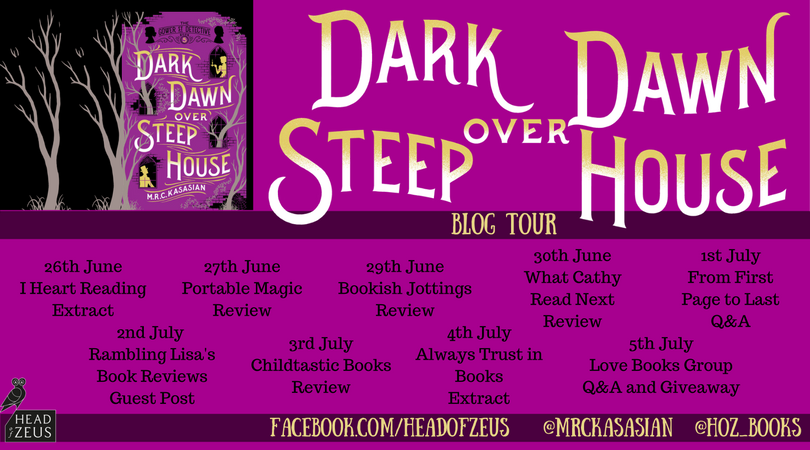As the name of my blog suggests, my reviews usually focus on children’s and young adults’ books. However, my reading does stretch beyond this remit and I particularly enjoy thrillers, crime and ghost stories, especially those set in Victorian times. Therefore, it was a real treat to discover a series that included all those elements, with a feisty, intelligent and wonderfully dry-humoured heroine to boot. I am talking of M.R.C. Kasasian’s ‘The Gower Street Detective’ series, narrated by the admirable and independent March Middleton, who details the always interesting and often bizarre crimes that she and her guardian Mr Sidney Grice (a personal, not private detective, if you please) set out to solve. Today, I am delighted to participate in the blog tour celebrating the new, and fifth, book in this excellent series by M.R.C. Kasasian.

What the book’s about
Dark Dawn Over Steep House opens in London, in 1884. Sidney Grice is restless – his latest case remains (unusually) unsolved and he turns to his book A Brief History of Doorstep Whitening in Preston for solace. Meanwhile, his ward, March Middleton, vows to find out what happened to Geraldine Hockaday, the daughter of a naval captain who was ‘outraged’ in a murky part of London and whose attacker is still roaming the streets. A chance encounter with two women – Lucy Bocking and her female companion Freddy – in a crowded café brings a new victim to light – it appears London has a serial offender on the loose. As Middleton and Grice recommence their investigations, their investigations lead them to the dining room of a Prussian Prince, the hangout of an Armenian gangster, and the ruin of a once-happy family home, Steep House.
Fancy a drink, March?
Slipping into this latest instalment by M.R.C. Kasasian was like coming home. The familiarity of the writing – dry, deft, humorous – and the characters – well-drawn and instantly recognisable – meant that I easily fell into the action and the story (not literally of course, just to clarify for Sidney Grice’s pedantic sake). March’s narrative voice is one that I could happily read endlessly, and is a testament to Kasasian’s writing (he teased another blogger by saying he wouldn’t reveal why he had chosen a female narrator instead of male – perhaps he might be tempted now?).
March is the kind of woman I’d like to go out and have a drink with, although I doubt I could keep up with her. Additionally, I’d probaby forego her favourite tipple of gin (it makes me morose and gives me a whopping headache) but we could hit a few cocktail bars and she could tell me about ‘Edward’ – her once husband-to-be. She might not like the smoking ban in drinking establishments, though, so we might spend the evening standing outside in the smokers’ area.
What I admire about March is that she sticks two fingers up at the Victorian establishment who, in the first book of the series, called her ‘a mere girl’ and wins the respect of her ward and even members of the police force, with whom she frequently liaises. She’s clever, sympathetic, determined and funny – and is a perfect contrast to Sidney Grice whose rudeness (or blunt honesty) knows no boundaries. In that way, he’s rather similar to Benedict Cumberbatch’s portrayal of Sherlock Holmes, although he does not drink, smoke or take drugs (heaven forbid) – preferring, instead, a nice cup of black tea made to very strict specifications. He is also a strict vegetarian, which means poor March must take her cravings for meat pies or pork chops out to lunch occasionally. Grice is also an avid inventor, seeking to trademark many of his creations (including a Victorian version of a thermos flask for Grice’s beloved tea).
He ain’t no Sherlock Holmes
A comparison to Sherlock Holmes would have incensed Sidney Grice. As March explains, in the opening sentence in this book:
“I was approached by a man from the London County Council yesterday. They want to put a blue plaque on the front of 125 Gower Street, commemorating Sidney Grice’s many years and countless triumphs here. I can only imagine how my guardian would have revelled in such glorification, especially as his detested rival Sherlock Holmes, being fictional, will never qualify for one.”
Yet, when reading the Gower Street series, you can hardly fail to notice the similarities between the two. Like Watson to Holmes, March is Grice’s recorder of tales, and the voice of sanity when he threatens to become too eccentric for his own good. Like Holmes, Grice has an amazing ability to tell things about people from the minutest of details (in this latest book, the age of a woman severely injured in a house fire when she was young, by the state of her teeth and skin on her hands). It has been said that the series is a pastiche of the works of Sherlock Holmes and I can see why this comparison was made. But be under no misapprehension that it lacks originality – the allusions serve to add to the richness and humour of the stories.
Sometimes a strong stomach is needed
While there is a great deal of humour in these books, crimes are still at the forefront of the action, and many are not for the fainted-hearted. When talking about the women who have been ‘outraged’ (Victorian euphemism for violated) in Dark Dawn Over Steep House, we see a side of sadism that makes for, at times, very uncomfortable reading. In previous books, there have been gruesome murders and disfigurements and stomach-churning visits to the mortuary that have had me squirming. The details are never salacious or unnecessarily grim but there is honesty about the crimes in this story, and the previous four, that can make you wince. Victorian London was, after all, a city of two sides – the squalor of the slums that encouraged both crime and cholera, and the wealth of the upper classes, who viewed visiting the slums as a kind of extreme sport (hence the women in this story being ‘outraged’ when visiting disreputable opium dens). March Middleton constantly battles with her conscience about this, handing out money when possible to street urchins and others in need, struggling to live a life of comparable luxury against a backdrop of abject poverty.
Characters that grow
Sometimes in series – book or television – and especially ones with a comic element, characters must remain frozen in a particular role in order continue playing their bespoke part in events. However, with this series, March and Sidney do grow and change, more specifically in relation to each other. In this latest instalment, the book commences with March challenging Sidney to tell her the truth behind his relationship with her mother – is he her father? Sidney denies it strenuously, but both March and the reader aren’t satisfied; there is something in her past that he’s not revealing. However, the guardian and his ward have definitely become closer as the series has progressed, and despite his often deprecating tone, it is clear that Sidney is very fond of his God-daughter.
March has also moved on from mourning the loss of her fiance… but she’s now mourning the loss of another suitor, Inspector George Pound, with whom she fell in love, somewhat against her will. Pound is still in her life but will not enter a relationship with her because of financial pride; her wealth is larger than his own. It seems as if March is destined to live life a reluctant spinster.
Molly the maid resides in the Shakespearean role of jester – providing comic relief at various points in each story. Her fidelity to her master is undeniable, as is her naivety in mistaking an insult for a compliment from her irascible employer.
Bedtime stories
I first came across the books on audible, during a difficult family time when I was driving to and from Devon on most weekends. The first book in the series had me enthralled, and meant I was mainly unaware of the miles I was clocking up in our grumpy and temperamental Citroen. Since then, I’ve introduced my husband to the series, and he’s now also become a huge fan – in fact we read them to each other at night like bedtime stories. When I asked him what it was he liked about the books, he said he liked the combination of humour and crime, and the interaction between March Middleton and Sidney Grice. In short, the books are a perfect recipe of action, characters and narration, although in this latest book, there is a fair amount of sadness too.
Dark Dawn Over Steep House, by M.R.C. Kasasian, is published by Head of Zeus.
@MRCKASASIAN
@HoZ_Books
Please note that while I was given a copy of Dark Dawn Over Steep House to review by the publishers, the views expressed in this post are entirely my own.
Advertisements Share this:





